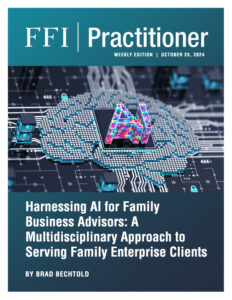
View this edition in our enhanced digital edition format with supporting visual insight and information.
In this week’s edition of FFI Practitioner, Dr. Brad Bechtold explores the possible utility of AI applications in family advisory practice for both individual advisors and multidisciplinary advisory teams. The article considers examples of AI tools that might enhance individual advisors’ expertise and improve their collaborations with one another across different disciplines.
In today’s rapidly evolving business landscape, family enterprises face complex challenges that require innovative solutions. With the integration of Artificial Intelligence (AI) in business advisory services, family business advisors now have powerful tools to enhance their multidisciplinary approach to serving family enterprises. From addressing family dynamics and helping to design a smooth succession planning process to navigating governance and operational complexities, AI can play a pivotal role in improving outcomes for both the family and the business.
This article explores how AI can enhance the service model for family business advisors and provides specific examples of AI applications that both individual advisors and multidisciplinary teams can leverage to offer more value to their family enterprise clients.
Elevating Advisors’ Expertise with AI
Each advisor, armed with AI-enhanced tools, can delve deeper into a specific domain of expertise, uncovering insights that would otherwise remain hidden to provide deeper, more nuanced advice. Collectively, AI can also elevate the effectiveness of multidisciplinary teams. When advisors from different disciplines collaborate on complex family business challenges, AI provides a common ground—data—that ensures consistency and clarity across domains. AI facilitates data-driven synergy among multidisciplinary advisors, enhancing collaboration by providing a unified, objective data set that all advisors can rely on. This reduces the risk of fragmented advice and ensures that all decisions are grounded in comprehensive, real-time data.
For instance, AI-powered sentiment analysis from a family mediator can be cross-referenced with financial data analyzed by a financial advisor, allowing the team to approach emotionally charged succession planning decisions with both emotional and financial insights. A multidisciplinary team advising on governance can use AI simulations to help model the impact of different leadership structures, combining structural insights with financial risk analysis. AI’s ability to process vast amounts of data and model complex scenarios helps the entire team see the full picture, resulting in recommendations that are aligned across legal, financial, governance, and operational domains. During succession planning, the team can combine AI-driven predictive analytics, governance assessments, and emotional intelligence tools to evaluate potential successors not just by financial performance, but also by leadership style, emotional maturity, and their alignment with family and business goals.
This multidisciplinary integration of AI can empower advisors to provide cohesive, holistic advice. It allows them to see beyond their individual silos and understand the broader context in which their recommendations fit, leading to solutions that are well-rounded and more likely to achieve long-term success for the family business.
Exploring Specific AI Applications across Diverse Advisory Disciplines
Family Dynamics: Enhancing Emotional Intelligence and Mediation
Navigating family dynamics is one of the most complex challenges for family enterprise advisors, especially when disputes, communication breakdowns, and differing visions for the future arise. AI tools designed to analyze human behavior and communication can offer valuable assistance in this space. Emotional intelligence tools can give advisors specializing in family dynamics enhanced insight into family members’ communication styles and emotional triggers, enabling more effective conflict resolution and relationship management. AI tools like Beyond Verbal or Cogito can analyze speech patterns, tone, and body language to provide insights into underlying emotions during family meetings or negotiations. These insights can help advisors mediate disputes more effectively by identifying emotional triggers and suggesting interventions to foster constructive communication.
For another example, AI-driven sentiment analysis tools such as IBM Watson or Lexalytics can evaluate the tone of written and spoken communications between family members. By identifying signs of frustration, tension, or disengagement early on, advisors can intervene before conflicts escalate. These AI tools enhance traditional human mediation skills, offering data-backed strategies for conflict resolution.
Succession Planning: Data-Driven Scenario Modeling and Predictive Analytics
Succession planning in family businesses may often entail emotional and business risks. AI can help streamline this process through data-driven decision-making tools. AI-powered platforms including SuccessFinder and HireVue offer predictive analytics that aid in assessing potential successors based on past performance, leadership potential, and personality traits. These tools gather data from various sources, including 360-degree feedback and employee performance reviews, to deliver objective assessments, which could help to reduce bias and subjectivity in the selection process.
Furthermore, AI tools such as AnyLogic and Simul8 can model various succession scenarios, providing real-time simulations that demonstrate potential outcomes. Advisors can use these scenario modeling tools to evaluate different succession strategies, allowing families to visualize the long-term impacts of each decision. These AI tools not only minimize risk but also provide a structured, data-backed approach to succession planning.
Governance: AI-Supported Decision-Making Frameworks
Effective governance is crucial for the long-term success of family businesses, and AI can provide valuable support in this area. A governance expert can use AI to analyze family business structures, uncover inefficiencies, and recommend transparent, effective governance models based on real-time data. AI-powered tools such as OrgVue or BoardEffect assist in analyzing governance structures, helping family business advisors assess board composition, evaluate the effectiveness of governance policies, and identify areas of improvement. For example, these tools can provide data-driven recommendations to balance family and business interests, ensuring that governance frameworks are transparent and fair.
In family meetings or board sessions, AI tools like Meeting Owl or Gong can help to track communication patterns, assess meeting effectiveness, and even identify decision-making bottlenecks. By analyzing how decisions are made and who influences them, these tools help advisors provide actionable insights to improve governance alignment between family members and the business.
Financial Advisory: AI-Driven Investment Strategies and Risk Management
Financial planning in family businesses requires a dual focus on the business’s financial health and the family’s wealth management needs. A financial advisor can use AI-powered predictive analytics to provide precise investment strategies and long-term financial forecasts that take into account vast amounts of economic data. This elevates their ability to offer personalized, data-driven solutions rather than relying on conventional methods that may be less accurate or timely. AI tools like BlackRock’s Aladdin or Wealthfront can assist advisors by providing real-time data analysis for investment strategies. These AI platforms aggregate vast amounts of financial data, including market trends, economic indicators, and historical business performance to deliver personalized investment recommendations aligned with the family’s long-term goals.
Moreover, AI can identify emerging financial risks. Tools including Kensho and Zest AI use predictive algorithms to flag potential financial vulnerabilities, allowing advisors to mitigate risks before they affect the family business. Whether it’s forecasting cash flow or evaluating investment opportunities, AI can help provide the financial clarity needed to make informed decisions.
Operational Efficiencies: AI-Powered Optimization
Operational efficiency is vital for maintaining competitiveness, and AI tools can help family business advisors pinpoint areas for improvement. AI-powered enterprise resource planning (ERP) systems such as SAP S/4HANA or Oracle NetSuite offer real-time data on supply chain performance, inventory management, and resource allocation. By analyzing these large datasets, AI can uncover inefficiencies that might not be apparent through human observation alone.
For instance, AI tools can predict demand fluctuations, optimize inventory levels, and streamline procurement processes, ultimately boosting profitability. Moreover, AI automation tools like UiPath can handle routine administrative tasks, freeing up employees to focus on higher-value strategic roles within the family business.
Talent Management: AI-Enhanced Recruitment and Retention
Attracting and retaining talent is a key challenge for family businesses, both internally and externally. AI-driven platforms like LinkedIn Talent Insights or PredictiveHire can support advisors by analyzing candidate profiles, identifying those best suited for key roles based on skills and cultural fit. These AI tools can also help reduce unconscious bias in hiring, ensuring that recruitment decisions are based on objective data rather than personal preferences or family dynamics.
For family members aspiring to leadership roles, AI-driven personality assessments such as Plum or Pymetrics provide objective evaluations of their strengths, weaknesses, and leadership potential. Additionally, AI tools can predict employee turnover by analyzing engagement data, enabling family business advisors to address retention challenges proactively.
AI as a Catalyst for Long-Term Family Enterprise Success
As family enterprises adapt to an increasingly complex environment, AI’s ability to offer predictive insights, automate routine processes, and uncover patterns enhances advisors’ ability to ensure the long-term sustainability of the business. Multidisciplinary teams can harness AI’s potential not just for solving immediate issues but for long-term strategic planning, ensuring that family businesses remain competitive and aligned with evolving market trends.
By embracing AI, family enterprise advisors can transform their approach from reactive problem-solving to proactive, strategic advising. This shift is critical in an era where family enterprises are navigating rapid technological, market, and generational changes. AI allows advisors to stay ahead of the curve, offering data-driven solutions that enable family businesses to thrive in both the short and long term.
Multidisciplinary advisors and advising teams who integrate AI into their services can be better positioned to offer nuanced, forward-thinking guidance that is grounded in real-time data and predictive analytics. AI’s transformative capabilities empower advisors to serve family businesses more effectively, ensuring both family harmony and business success for generations to come.
Conclusion
AI represents a transformative opportunity for family business advisors to elevate their multidisciplinary approach. Each advisor, whether specializing in legal, financial, organizational, or emotional facets, can leverage AI to enhance the quality and depth of their services. By integrating AI tools into their individual areas of expertise and into their collective skills as a team, multidisciplinary advisors can deliver more comprehensive, data-driven solutions that meet the unique needs of family enterprises.
–
Disclaimer: The views expressed in this article are those of the author only. The information contained in this article is provided solely for informational purposes. This article does not constitute legal, financial, or tax advice.
About the Contributor

Brad Bechtold, EdD, is the executive director of The Kim S. Miller Family Enterprise Institute of South Carolina at Anderson University. The Institute is dedicated to serving family-owned businesses through education, research, and community engagement. The Institute offers a range of programs and services designed to support the unique needs of family enterprises, fostering their growth and sustainability. Dr. Bechtold can be reached at bbechtold@andersonuniversity.edu.

View this edition in our enhanced digital edition format with supporting visual insight and information.





